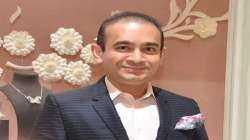PNB fraud case: Nirav Modi faces 'high risk of suicide', his legal team tells UK court
A UK court hearing arguments in the extradition case of Nirav Modi on Thursday heard expert views on the fugitive diamond merchant’s personal family history of suicide and his deteriorating mental health in prison, which would only further deteriorate in solitary confinement.

A UK court hearing arguments in the extradition case of Nirav Modi on Thursday heard expert views on the fugitive diamond merchant’s personal family history of suicide and his deteriorating mental health in prison, which would only further deteriorate in solitary confinement.
Justice Samuel Goozee, presiding over the case at Westminster Magistrate’s Court in London, was presented with three defence witnesses on day four of the five-day hearing, with each giving expert evidence on the 49-year-old jeweller's severe depression, risk from COVID-19 and the lack of adequate facilities at Arthur Road Jail in Mumbai where he is to be held on being extradited.
The Crown Prosecution Service (CPS), appearing on behalf of the Indian authorities in the USD 2-billion Punjab National Bank (PNB) fraud and money laundering case, argued that the conditions at Barrack 12 in Arthur Road Jail would be better than those the jeweller is currently faced with in a COVID-19 locked-down Wandsworth Prison cell in London.
"Coupled with a severe condition of depression, in my view, he presents a high risk of suicide albeit not immediately," said Dr Andrew Forrester, a forensic psychiatrist who has examined Modi on four occasions between September last year and August this year.
Referring to the "suicide of his mother", Dr Forrester stressed that as a "significant feature" as Modi’s mental health condition was on a deterioration trajectory and meets the criteria for hospital treatment in the absence of a multi-professional plan involving anti-depressants and psychotherapy.
The medical expert revealed that while Modi is currently on anti-depressants, the lack of supportive therapy or counselling due to COVID-19 lockdown restrictions in prison meant he was displaying signs of psychomotor retardation, a more severe form of depression which involves a manifest slowing down in movement and speech.
"If by contrast, he was given full access to multi-professional mental health care, better than he is currently getting at Wandsworth, would that assurance be helpful,” asked CPS barrister Helen Malcolm, implying that the government of India may be open to providing such an assurance.
Forrester agreed to take that into account and discuss Modi’s treatment with any medical professionals appointed in India in the future. He separately also dismissed the possibility of Modi “faking his symptoms” in an attempt to mislead or deceive the court.
His testimony in court followed live videolink evidence from Thailand by Richard Coker, an Emeritus Professor at London School Hygiene and Tropical Medicine and an expert in epidemiology and infectious disease, in support of defence arguments over the high COVID-19 risk Modi would be exposed to at Arthur Road Jail – which has had an outbreak back in May.
While the Indian government had earlier submitted data to highlight that the outbreak has been fully contained, Coker countered: “COVID spreads extremely effectively through prisons… and the risk increases if community prevalence of disease is high."
He assessed a 0.75 per cent risk of death should Modi contract COVID-19 at Arthur Road Jail, a figure the CPS sought to compare with other infectious diseases such as malaria. Better ventilation and space at Barrack 12 was also flagged as a positive, as opposed to the overcrowded setting at Wandsworth Prison in London.
"There is an equal possibility of bringing [COVID-19] into this courtroom, unwittingly,” said Malcolm, in reference to the risk factor from coronavirus in the wider community.
Inadequate prison conditions once again remained at the heart of the defence arguments as they also deposed Dr Alan Mitchell, a medical practitioner and prisons expert as chair of the Independent Prisons Monitoring Group in Scotland.
Mitchell, who has in the past given evidence on the unsuitability of Barrack 12 in the extradition case of Kingfisher Airlines boss Vijay Mallya, reiterated some of his concerns around the lack of natural lighting.
Asked about the Indian government’s latest video of the Barrack played in court earlier in the week, he said: “Those are the elements you don’t pick up in a video.”
Meanwhile, Modi continued to observe the proceedings via videolink and referred to files laid out before him.
He is subject to two sets of criminal proceedings, the first brought by the Central Bureau of Investigation (CBI) relating to a large-scale fraud said to have been committed upon PNB and the Enforcement Directorate (ED) case, relating to the laundering of the proceeds of that fraud.
A further extradition request relates to allegations that Modi interfered with the CBI investigation by causing the disappearance of evidence and intimidating a witness.
The CPS must establish a prima facie case against Modi to allow the judge to rule that he has a case to answer before the Indian courts. If the judge finds a prima facie case against Modi, it will go to UK Home Secretary Priti Patel to formally certify his extradition to India to stand trial.
A ruling in the case is not expected before the end of this year or early next year, with a hearing for final submissions tentatively scheduled for December 1.